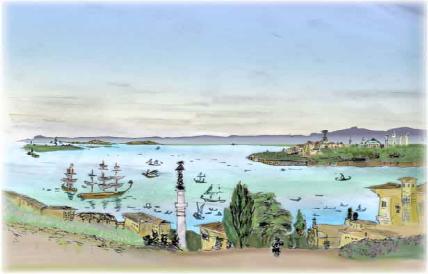 |
||





“Dejem was widely considered the paradise Nef used to feel like, still officially a neutral island without Godlians, where the old language was still spoken, and people greeted each other on the street with hugs, familiar to me through the old literature, though startling to see, and where the cafés were crowded but not raucous and dangerous with drunk, angry people looking for strangers to blame for their confusions. It was a culture that had been dedicated primarily to the arts since the ancient celebrant times, the times of the twelve marble theaters, when both South and Northern continents regularly sent musicians and dancers to Dejem to study and compete in the festivals.”
The modern festival, a vestige of the old times, was the still greatest event on the archipelago, and the cliff singing was among the best of all the islands of the southern continent; it was clear that my uncle was honoring me in his quiet way. He had been invited as the highest official of the Nefian court besides the king, which meant he was given a white-walled house in the hillside garden of the governor of Dejem, with jasmine terraces overlooking a private cove, and beyond it a shallow bay of the lightest blue, reflecting the depths of the sky itself but also clear enough to show its dolphins and turtles and swaying weeds. Low tide was a fantasy of mist, and sails, and dune grass, and oystermen seeming to walk on the water.
. . . . The political organization of the island, reconstituted by celebrant wise men, was unique on the southern continent, and an inspiration to our own continent much later in the North. Each village was mostly autonomous, but committed to aid and protect at least two others, so that no village was alone in a crisis, and no burden was solitary on just one other village. After the plague, people started coming again to Dejem to compete at the festival or make pilgrimage to the temples; many people stayed, especially those who could not thrive in their own native culture. Dejem was full of the sensitives of all the islands, the singers, and painters, and dream tellers, and those people too porous of other people's moods, who thrived again along the wild beaches and tidal marshes of Dejem Island, full of salt wind whistling through the grass, and solitude.
It was not only the official representatives of the archipelago islands who came to Dejem to compete. Informally as well there was much singing and drumming from the natural acoustic concavities of the cliffsides, that had been carved over the millennia by wind and sand. When the official competitors were not singing, always another visitor was waiting to take a turn, so that throughout the moon cycle, there was always music reverberating between those cliffs. Many competitors had opened training schools on the island, or had found work singing in the temples, or preparing the island for the month-long festival, which took most of the rest of the year to organize.
Twelve ancient theaters still overlooked the valley in the rustic town of Xafa, on a hill at the center of Dejem Island, and on the hillside above them stood twelve marble temples, mostly untouched by earthquake, acoustically amplified by the smooth rock of the hillside, each one dedicated to one or another of the ancient gods.
![]()